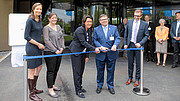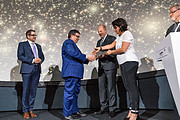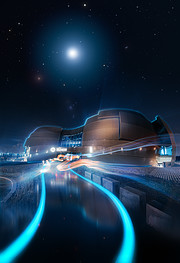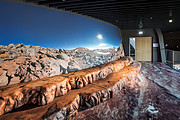Press Release
A New Supernova Over Munich
Inauguration of the ESO Supernova Planetarium & Visitor Centre
27 April 2018
On 26 April 2018, the ESO Supernova Planetarium & Visitor Centre was officially inaugurated, and its doors will be open to the public from tomorrow 28 April 2018. The centre, located at ESO Headquarters in Garching, Germany provides visitors with an immersive experience of astronomy in general, along with ESO-specific scientific results, projects, and technological breakthroughs. All activities in the ESO Supernova will be free of charge during 2018, and shows and other events can be booked online.
The ESO Supernova Planetarium & Visitor Centre is a cooperation between the European Southern Observatory (ESO) and the Heidelberg Institute for Theoretical Studies (HITS). The building is a donation from the Klaus Tschira Stiftung (KTS), a foundation that promotes natural sciences, mathematics and computer science. ESO will run the facility [1].
The striking building was designed by the architects Bernhardt + Partner. It resembles a close binary star system with one star transferring mass to its companion. This leads to the heavier star exploding as a supernova, briefly shining as bright as all the stars in a galaxy combined. The centre — aptly named the ESO Supernova — similarly shines brightly, to generate enthusiasm and passion for astronomy in the young and not-so-young alike.
At the heart of the ESO Supernova is a digital planetarium that offers an immersive experience through the use of state-of-the-art visualisation techniques. The planetarium screens many different shows and other cultural events. Visitors between April and June 2018 can pick from eight planetarium shows, ranging from the award-winning The Secrets of Gravity animated film about Albert Einstein’s discoveries to the giant-screen documentary adventure Hidden Universe.
For school classes, the ESO Supernova also offers two specially designed planetarium shows — A Tour of the Solar System and The Skies Above Us — and six workshops specially tailored to the curriculum. The programme for visitor groups is aimed at children in kindergarten, primary school and all secondary schools. For teachers, the ESO Supernova offers special teacher training.
The ESO Supernova also hosts an interactive astronomical exhibition where visitors can explore and examine real astronomical artefacts and conduct experiments to get an idea of what it means to be an astronomer, to work in science, and to discover the mysteries of the Universe. The first permanent exhibition is The Living Universe, which covers the broad topic of life in the Universe.
Highlights include: a 40-meter image of the night sky (arguably the largest in the world), a meteorite and a mirror segment from the future Extremely Large Telescope that visitors can touch, a hands-on station where visitors can build their own telescope and athletic visitors can even take a ride on a bicycle that travels at the speed of light! The exhibition can be experienced independently or as part of a guided tour.
The seminar rooms on the top floor house space for lectures, workshops and conferences, while The Void on the ground floor is a central area with a unique and beautiful star-roof.
The ESO Supernova will be open each week between 9:00 and 17:00, Wednesdays to Fridays, and between 12:00 and 17:00 on Saturdays and Sundays. Free tickets can be booked online and printed out after arrival at the centre.
All content is provided in both English and German and is completely free of charge in 2018. More information, including the programme and details about planning a visit, are available on the ESO Supernova website.
Visitors can sign up for the Public Newsletter and follow @ESOSupernovaDE in German on Facebook and/or Twitter, or @ESOSupernova in English on Facebook and/or Twitter. Media representatives can also sign up to receive news here, while educators have the option to receive a dedicated Education Newsletter.
Donations for and partnerships with the ESO Supernova are welcome. The spaces are also available for rent.
Notes
[1] Having developed the idea for an exciting and innovative new building for astronomy education and public outreach, the late Klaus Tschira, then Managing Director of the Klaus Tschira Stiftung (KTS) and the Heidelberg Institute for Theoretical Studies (HITS), started discussing options with ESO for hosting the facility. In December 2013, ESO officially accepted the donation of the facility.
More information
ESO Supernova is proudly supported by: LOR Foundation, Evans & Sutherland and Sky-Skan
KTS
The Klaus Tschira Stiftung (KTS) was created in 1995 by the physicist and SAP co-founder Klaus Tschira (1940–2015). It is one of Europe’s largest privately funded non-profit foundations. The Foundation promotes the advancement of the natural sciences, mathematics, and computer science, and strives to raise appreciation for these fields. The Foundation’s commitment begins in kindergarten and continues in schools, universities, and research facilities. The Foundation champions new methods of scientific knowledge transfer, and supports both development and intelligible presentation of research findings. The ESO Supernova is a donation from the KTS, and ESO will run the facility.
HITS
The Heidelberg Institute for Theoretical Studies (HITS gGmbH) was established in 2010 by the physicist and SAP co-founder Klaus Tschira (1940–2015) and the Klaus Tschira Foundation as a private, non-profit research institute. HITS conducts basic research in the natural sciences, mathematics, and computer science, with a focus on the processing, structuring, and analysing large amounts of data. The research fields range from molecular biology to astrophysics. The shareholders of HITS are the HITS Stiftung, which is a subsidiary of the Klaus Tschira Foundation, Heidelberg University and the Karlsruhe Institute of Technology (KIT). HITS also cooperates with other universities and research institutes and with industrial partners. The base funding of HITS is provided by the HITS Stiftung with funds received from the Klaus Tschira Foundation. The primary external funding agencies are the Federal Ministry of Education and Research (BMBF), the German Research Foundation (DFG), and the European Union.
ESO
ESO is the foremost intergovernmental astronomy organisation in Europe and the world’s most productive ground-based astronomical observatory by far. It has 15 Member States: Austria, Belgium, Czechia, Denmark, France, Finland, Germany, Italy, the Netherlands, Poland, Portugal, Spain, Sweden, Switzerland and the United Kingdom, along with the host state of Chile and with Australia as a strategic partner. ESO carries out an ambitious programme focused on the design, construction and operation of powerful ground-based observing facilities enabling astronomers to make important scientific discoveries. ESO also plays a leading role in promoting and organising cooperation in astronomical research. ESO operates three unique world-class observing sites in Chile: La Silla, Paranal and Chajnantor. At Paranal, ESO operates the Very Large Telescope and its world-leading Very Large Telescope Interferometer as well as two survey telescopes, VISTA working in the infrared and the visible-light VLT Survey Telescope. ESO is also a major partner in two facilities on Chajnantor, APEX and ALMA, the largest astronomical project in existence. And on Cerro Armazones, close to Paranal, ESO is building the 39-metre Extremely Large Telescope, the ELT, which will become “the world’s biggest eye on the sky”.
Links
- Press kit (PDF 4.8 MB)
- ESO Supernova Facts (PDF 452 KB)
- The ESO Supernova website
- Images related to the ESO Supernova
- Videos of the ESO Supernova
- ESO Supernova factsheet in English and in German
Contacts
Tania Johnston
ESO Supernova Coordinator
Garching bei München, Germany
Tel: +49 89 3200 6130
Email: tjohnsto@eso.org
Richard Hook
ESO Public Information Officer
Garching bei München, Germany
Tel: +49 89 3200 6655
Cell: +49 151 1537 3591
Email: rhook@eso.org
About the Release
| Release No.: | eso1813 |
| Name: | ESO Supernova Planetarium & Visitor Centre |
| Type: | Unspecified : Technology : Observatory : Facility |
Our use of Cookies
We use cookies that are essential for accessing our websites and using our services. We also use cookies to analyse, measure and improve our websites’ performance, to enable content sharing via social media and to display media content hosted on third-party platforms.
ESO Cookies Policy
The European Organisation for Astronomical Research in the Southern Hemisphere (ESO) is the pre-eminent intergovernmental science and technology organisation in astronomy. It carries out an ambitious programme focused on the design, construction and operation of powerful ground-based observing facilities for astronomy.
This Cookies Policy is intended to provide clarity by outlining the cookies used on the ESO public websites, their functions, the options you have for controlling them, and the ways you can contact us for additional details.
What are cookies?
Cookies are small pieces of data stored on your device by websites you visit. They serve various purposes, such as remembering login credentials and preferences and enhance your browsing experience.
Categories of cookies we use
Essential cookies (always active): These cookies are strictly necessary for the proper functioning of our website. Without these cookies, the website cannot operate correctly, and certain services, such as logging in or accessing secure areas, may not be available; because they are essential for the website’s operation, they cannot be disabled.
Functional Cookies: These cookies enhance your browsing experience by enabling additional features and personalization, such as remembering your preferences and settings. While not strictly necessary for the website to function, they improve usability and convenience; these cookies are only placed if you provide your consent.
Analytics cookies: These cookies collect information about how visitors interact with our website, such as which pages are visited most often and how users navigate the site. This data helps us improve website performance, optimize content, and enhance the user experience; these cookies are only placed if you provide your consent. We use the following analytics cookies.
Matomo Cookies:
This website uses Matomo (formerly Piwik), an open source software which enables the statistical analysis of website visits. Matomo uses cookies (text files) which are saved on your computer and which allow us to analyze how you use our website. The website user information generated by the cookies will only be saved on the servers of our IT Department. We use this information to analyze www.eso.org visits and to prepare reports on website activities. These data will not be disclosed to third parties.
On behalf of ESO, Matomo will use this information for the purpose of evaluating your use of the website, compiling reports on website activity and providing other services relating to website activity and internet usage.
Matomo cookies settings:
Additional Third-party cookies on ESO websites: some of our pages display content from external providers, e.g. YouTube.
Such third-party services are outside of ESO control and may, at any time, change their terms of service, use of cookies, etc.
YouTube: Some videos on the ESO website are embedded from ESO’s official YouTube channel. We have enabled YouTube’s privacy-enhanced mode, meaning that no cookies are set unless the user actively clicks on the video to play it. Additionally, in this mode, YouTube does not store any personally identifiable cookie data for embedded video playbacks. For more details, please refer to YouTube’s embedding videos information page.
Cookies can also be classified based on the following elements.
Regarding the domain, there are:
- First-party cookies, set by the website you are currently visiting. They are stored by the same domain that you are browsing and are used to enhance your experience on that site;
- Third-party cookies, set by a domain other than the one you are currently visiting.
As for their duration, cookies can be:
- Browser-session cookies, which are deleted when the user closes the browser;
- Stored cookies, which stay on the user's device for a predetermined period of time.
How to manage cookies
Cookie settings: You can modify your cookie choices for the ESO webpages at any time by clicking on the link Cookie settings at the bottom of any page.
In your browser: If you wish to delete cookies or instruct your browser to delete or block cookies by default, please visit the help pages of your browser:
Please be aware that if you delete or decline cookies, certain functionalities of our website may be not be available and your browsing experience may be affected.
You can set most browsers to prevent any cookies being placed on your device, but you may then have to manually adjust some preferences every time you visit a site/page. And some services and functionalities may not work properly at all (e.g. profile logging-in, shop check out).
Updates to the ESO Cookies Policy
The ESO Cookies Policy may be subject to future updates, which will be made available on this page.
Additional information
For any queries related to cookies, please contact: pdprATesoDOTorg.
As ESO public webpages are managed by our Department of Communication, your questions will be dealt with the support of the said Department.
























